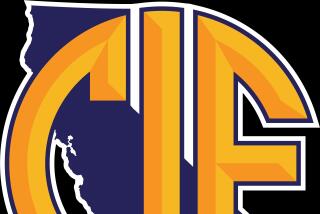Dempsey Takes On Sports Agents
DALLAS — Reacting to the scandal that rocked USC, UCLA and other schools this fall, NCAA Executive Director Cedric Dempsey said Sunday it is time to tackle head on the issue of sports agents.
Speaking in his state of association address to open the 90th NCAA convention in Dallas, Dempsey announced that the NCAA Council formed a special committee Saturday to study agent and professionalism problems and recommend solutions this year.
“We cannot let the actions of a few unscrupulous agents destroy the basic fiber of this organization,” Dempsey told the 2,600 representatives from 902 schools who will consider about 130 legislative bills today and Tuesday.
Although the problems with agents in college athletics is an old one, it became one of the most discussed topics of college sports last year.
The issue first surfaced at USC last summer when star wide receiver Keyshawn Johnson was accused of accepting money from an agent while he played at West L.A. College. An NCAA and Pacific 10 Conference inquiry failed to uncover enough evidence to prove wrongdoing. Johnson denied the allegations, saying the agent in question was a longtime friend.
Then in the fall, three other Trojans were accused of having links to another agent, Robert Troy Caron of Oxnard. The players--Errick Herrin, Israel Ifeanyi and Shawn Walters--were suspended for allegedly accepting money and other items from Caron’s representatives.
UCLA’s Donnie Edwards also was suspended for a game for accepting a bag of groceries worth about $150 from Caron. Edwards, however, said he did not know who left the groceries at his doorstep after he complained during a radio interview that he was not getting enough to eat.
NCAA rules prohibit athletes from accepting payment or other benefits from agents. Last summer, the eligibility committee decided to levy stiff penalties in agent cases to try to curtail the activity.
But Dempsey warned the membership Sunday that it cannot ignore its role in creating a climate in which athletes will risk eligibility for some benefits.
“The world of the student-athlete has changed every bit as dramatically as the world of college presidents, athletics directors and coaches,” he said. “Yet I am not convinced that we fully recognize and respond to the real world of today’s student-athlete. And it is not fair to today’s student-athletes for us to cling to a vision of intercollegiate athletics as it existed when we were in school.”
Later, Dempsey said it is imperative to attack the agent problem in high schools because the recruiting process begins there. He also suggested that state regulators and professional sports players’ associations have power to help eradicate the problem. Twenty-two states have laws against unethical sports agent conduct.
What the NCAA Council committee concludes will be interesting because the membership does not agree on what to do about agents. Some want the NCAA enforcement staff to be more diligent in trying to stop agents from contacting players whereas others call for loosening of the rules.
“There should be a decriminalization of the agent situation,” Ohio State Athletic Director Andy Geiger said. “The kids ought to be able to work with those wishing to represent athletes.”
Geiger wonders how college leaders can expect the athletes to have no help throughout their careers and then suddenly be thrust into an “intense auction.”
“Everything now is being done in the dark of night so we don’t know or we don’t want to know what is happening,” he said.
Geiger also said athletic directors are having difficulty dealing with the agent runners who come to the campuses to recruit because they often are former players.
“You wind up being a police force against your own alumni,” he said.
More to Read
Go beyond the scoreboard
Get the latest on L.A.'s teams in the daily Sports Report newsletter.
You may occasionally receive promotional content from the Los Angeles Times.






